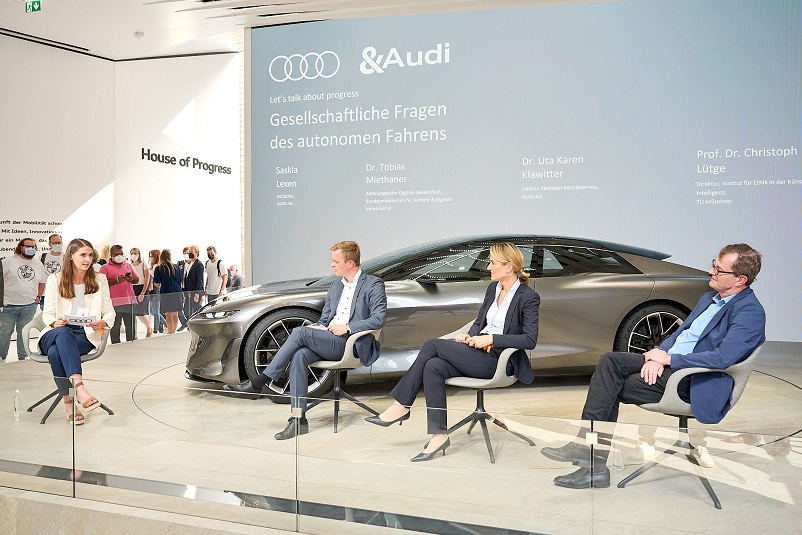 Central Munich plays host to expert panel discussion at the IAA on the legal, ethical and political issues related to autonomous driving
Central Munich plays host to expert panel discussion at the IAA on the legal, ethical and political issues related to autonomous driving
Christoph Lütge, Director Institute for Ethics in Artificial Intelligence at the Technical University of Munich: “We need to take care not to view autonomous driving solely as a technical challenge. The only way for us to fully harness the opportunities of this technology is by engaging in a dialog with people and taking their concerns into account.”
Looking ahead to the publication of the &Audi Initiative’s expert study in October 2021
The steering wheel retracts as if by magic, the driver’s seat slides into a comfortable position, and the car keeps on driving by itself. With its fully electric show car, the Audi grandsphere concept, the premium carmaker is showing at the IAA how the interior of the vehicle will change in the future as the driver becomes a passenger when driving functions become increasingly automated.
In addition to the technological outlook, Audi’s activities at the IAA focused on the social aspect of automated driving with a panel discussion at the “House of Progress” brand pavilion in Munich.
“After e-mobility, the next and significantly more radical change will be the shift to smarter and, ultimately, autonomous vehicles,” says Markus Duesmann, CEO of AUDI AG.
“For us, automated driving is a key technology with the potential to make traffic safer and mobility more comfortable and inclusive.”
With the Audi grandsphere concept, the premium carmaker is showing the IAA how fully automated driving enables new levels of freedom. In Level 4 mode, the interior turns into a spacious sphere of experience without a steering wheel, pedals, or displays.
As well as taking over the task of driving wherever possible, the vehicle offers everyone on board a wide range of options for taking advantage of this freedom for relaxation, work, or entertainment. Audi is working with CARIAD, the Volkswagen Group’s software think tank, toward introducing the technology in the second half of the decade.
The broad-based acceptance of autonomous driving depends on the technological maturity of the driving systems as well as on the social aspect and moral issues around road traffic. Duesmann says that it will require a major adjustment for people to get used to literally no longer holding the steering wheel in their hand. At the IAA, Audi therefore addressed not only the technological solutions but also the social issues of the autonomous driving revolution.
At Wittelsbacherplatz in Munich, Uta Karen Klawitter, General Counsel Legal Services AUDI AG, Tobias Miethaner, Head of Department Digital Society, Federal Ministry of Transport and Digital Infrastructure, and Christoph Lütge, Director Institute for Ethics in Artificial Intelligence at the Technical University of Munich, engaged in a panel discussion led by Saskia Lexen, Project Manager for the &Audi Initiative at AUDI AG.
Klawitter, Miethaner and Lütge are three of the more than 20 experts from universities, companies, associations and politics with whom the &Audi Initiative discussed the social issues of autonomous driving in spring and summer 2021.
What legal and political conditions are required for the vision of future mobility to become a reality, and what are the necessary data protection regulations? How do people’s attitudes need to change in order for new technologies like autonomous driving to enjoy broad-based acceptance?
In the discussion, Lütge emphasized the importance of an interdisciplinary approach to the technology: “We need to take care not to view autonomous driving solely as a technical challenge. The only way for us to fully harness the opportunities of this technology is by engaging in a dialog with people and taking their concerns into account.”
Miethaner is confident that trust in autonomous driving will increase by itself as the vehicles are gradually rolled out: “I firmly believe that people will want this technology once they appreciate its potential to make traffic jams a thing of the past.” Klawitter had positive words for the German Federal Government’s legislation on Level 4 vehicles: “This legal framework lays the foundations for getting almost every potential Level 4 autonomous driving application onto the road.”
The results will be published in October 2021 with three focal areas: “Law and progress” will discuss topics including current questions of liability, “The relationship of trust between man and machine” will address the ethical aspect of autonomous driving, and “Connected security” will focus on relevant aspects of data protection. The experts will examine the issues from their own professional perspective.
“We believe that a transparent, interdisciplinary dialog about the opportunities and challenges of autonomous driving is the only way to generate the necessary acceptance of the technology,” says Saskia Lexen.
About the &Audi Initiative
Audi launched the &Audi Initiative six years ago. Developed from the activities of the carmaker’s “beyond” initiative, it is intended to stimulate interdisciplinary dialog on new technologies such as artificial intelligence, promote the positive acceptance of the technology in the long term, and establish appropriate expectations with regard to the possibilities and limits of new technologies in society.
With its latest study “SocAlty”, the &Audi Initiative has set itself the target of making a significant contribution to the public debate on autonomous driving and the responsible use of new technologies in mobility.

































